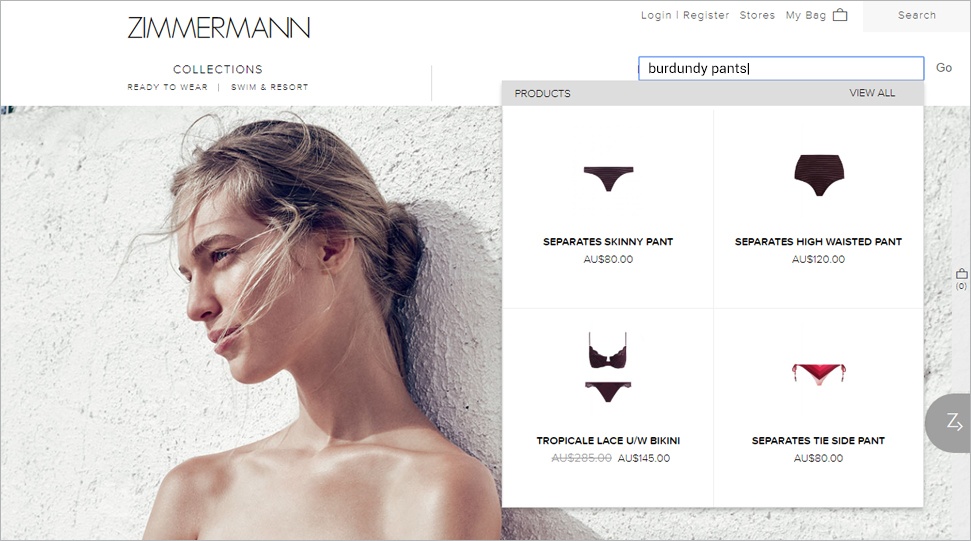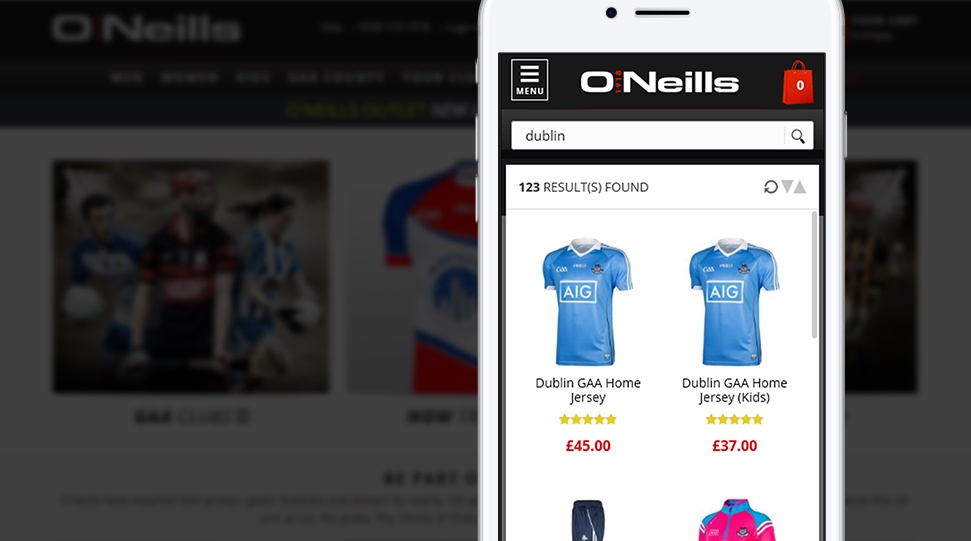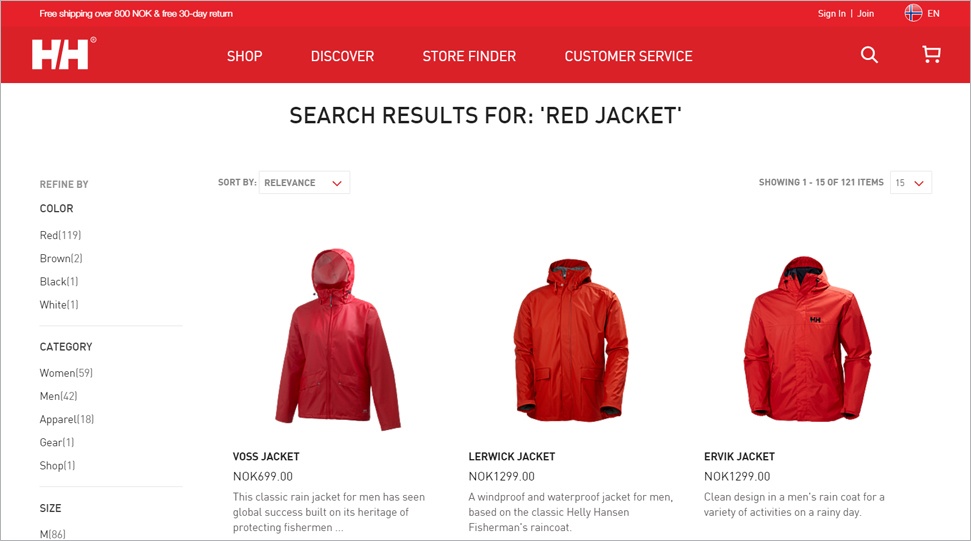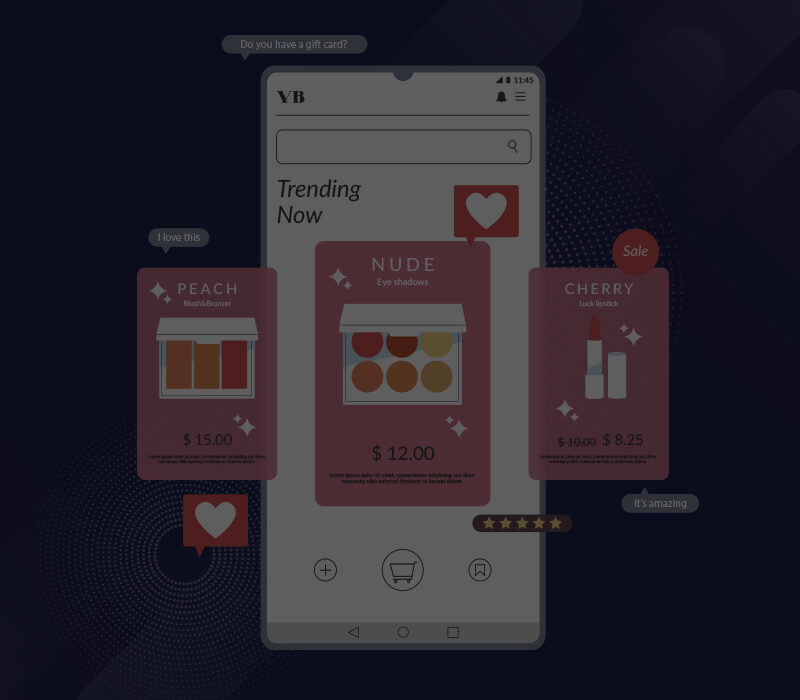Blog
How search can help fashion retailers to drive more sales online
The online fashion vertical can be a tough environment to do business in, particularly if you’re a pure-play selling into a crowded marketplace with heavy competition around price, challenges around increased CPAs causing reduced margins and brands digging into demand by launching D2C channels.

Fashion retailers need to continually look for ways to improve their customer offering, in order to drive sales and improve engagement. One way that some larger fashion stores are tackling the challenge is by investing in search. In this article, we take a look at the specific challenges faced by fashion retailers, and examine how on site search can be used to solve those challenges, with measurable results that impact the bottom line.
More sophisticated query matching technology
One significant challenge for retailers across all sectors is that of language. This is particularly pronounced in the fashion world, where there are often multiple ways to describe a product, or a product variant. A sweater, for example, can also be called a jumper, a pullover or a jersey. Customers searching for a jersey may also be interested in related products such as sweatshirts or tank tops. Moving on to product variants like colours, a customer may describe a sweater as brown, fawn, taupe, chocolate, beige or even chestnut.
In traditional search tools, the search algorithm was based on the usage of specific keywords. If the search term was present in the product name or description, the product was included in the search results. If the keyword wasn’t present, however, there would be no match and any non-matching products would not be displayed in results. Using the examples above, it’s clear to see that the keyword-driven approach could mean many fashion stores could not accurately retrieve results from their product catalogs.
Today, search is moving on from keyword-driven algorithms, and natural language processing, which is a key component of Klevu, is moving into view. NLP works on a semantic, or meaning-driven, basis, to deliver search results that take into account context and relevance. NLP-based search tools are far more likely to understand synonyms, slang terms and regional language variants, so that they can ‘interpret’ what the customer wants, rather than simply making a binary keyword matching decision.
Another challenge faced by the fashion industry is the growth of smartphone usage for online shopping. Many consumers using fashion websites are relatively young, often millennials, and as such, they prefer to carry out much of their online activity via their smartphones, including their shopping. With smartphones becoming the device of choice for many, retailers are now looking at designing online stores primarily for mobile use, with desktop design increasingly likely to take second place. As such, the tricky issue of navigation menus becomes much more important and many retailers are considering a switch to on site-search as the primary means of site navigation. Our client O’Neills is a good example of this, as can be seen below.

Certain retail giants, like Amazon and eBay, have championed this approach for some time, but the surge in mobile use for online shopping means that it is now a sensible option for retailers of all sizes and many of our clients have gone down this route. With search so central to the shopping experience, retailers need to ensure that they put in place a best of breed ‘smart search’ solution at the same time as redesigning their sites.
Handling the parent / child relationship with configurable and simple products
Whatever area of fashion a particular retailer specialises in, that retailer will undoubtedly be all too familiar with the issue of product variants. Clothes, shoes and accessories typically come in multiple styles and colours, and it can be difficult to accurately present all of these variants to the customer, in a clear and consistent way, and without overloading or confusing the customer.
So if a user searches for a red jacket for example, but the merchant is displaying a single configurable representative of the product which ordinarily shows a black version of the jacket, the image should change to the red version and then automatically link to the configured version (red in this instance). This is something that Klevu does out of the box, as can be seen on the Helly Hansen store below.

Rich search dropdowns also help deliver an immediate, relevant result set to customers. These dropdowns typically present the first handful of relevant results, with image thumbnails, available colour swatches and size options, prices and merchandising badges all displayed, without requiring a full page load. When delivering to millennials, who have grown up in an always-on world of instant results, speed is very much of the essence, so techniques such as auto-suggest and rich search results can really help to keep the customer engaged and motivated to complete their purchase.
Our Magento and Shopify integrations also allow merchants to retain their “quick buy” functions in their search results, which again speeds up the purchasing process.
Fashion retail is well known for having an astonishing level of customer returns. The offline fashion industry has long offered very generous ‘no questions asked’ returns policies, and this has passed through into online retail. Clear information about an online fashion retailer’s returns and refunds policies can make all the difference when it comes to gaining a purchasing commitment from a new customer. Klevu users are able to serve static content pages within search results, as well as product catalog items, so that, for example, if a customer searches for ‘returns’, they are presented with the store’s returns policy page, and if they search for ‘delivery’, they are directed to a page giving full details of all delivery options available. Including static content in search results, such as information pages, size guides and even blog content can all help to build confidence, engagement and loyalty.
The machine learning feature of Klevu also helps to support the merchandising rules being created by the user, by automatically promoting products based on user interaction – add to carts, click-throughs and completed purchases. This has been really popular with a lot of our larger fashion merchants and is something that some of our clients, who have larger catalogs.
It’s clear that fashion retail is one of the hardest sectors to trade in, with threats from competitors alongside unique customer requirements and behaviour patterns all combining to make it extremely challenging to win those crucial sales. With a smart, NLP-based search tool in place, however, switched-on fashion retailers can position themselves ahead of the competition, and can influence customer engagement and loyalty for ongoing and significant sales improvements.


